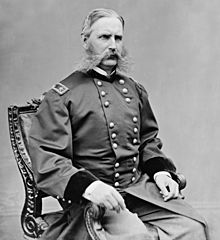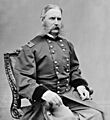Christopher C. Augur facts for kids
Quick facts for kids
Christopher Columbus Augur
|
|
|---|---|

Christopher C. Augur
|
|
| Born | July 10, 1821 Kendall, New York |
| Died | January 16, 1898 (aged 76) Georgetown, Washington, D.C. |
| Place of burial | |
| Allegiance | United States of America Union |
| Service/ |
United States Army Union Army |
| Years of service | 1843–1885 |
| Rank | |
| Unit | 4th U.S. Infantry 13th U.S. Infantry |
| Commands held | Eastern Iron Brigade 2nd Division, II Corps XXII Corps Department of Washington Department of the Missouri 12th U.S. Infantry |
| Battles/wars | Yakima War Rogue River Wars Mexican–American War American Civil War |
Christopher Columbus Augur was an American military officer. He was born on July 10, 1821, and died on January 16, 1898. He is best known for his important role in the American Civil War. Even though he might not be as famous as some other generals, he was a very skilled leader in battles.
Contents
Early Life and Military Training
Christopher Augur was born in Kendall, New York. His family later moved to Michigan. In 1839, he started studying at West Point. This is a famous military school. He graduated in 1843. In his class was Ulysses S. Grant, who would later become a famous general and president.
Early Military Service
After graduating, Augur served as an aide-de-camp. This means he was a personal assistant to generals. He worked for Generals Hopping and Cushing during the Mexican–American War. In the 1850s, he was involved in campaigns on the western frontier. He fought against the Yakima and Rogue River tribes. In Oregon, he helped build Fort Hoskins.
Service in the Civil War
The American Civil War began in 1861. Augur was promoted to Major in the 13th Infantry on May 14, 1861. On August 26, 1861, he became the Commandant of Cadets at West Point. He taught infantry tactics there. In November 1861, Augur was made a Brigadier General of volunteers. He was given command of a brigade. In July 1862, he was transferred to lead a division under Major General Nathaniel Banks.
Battle of Cedar Mountain
Augur was badly wounded at the Battle of Cedar Mountain in August 1862. Despite his injury, President Abraham Lincoln nominated him for Major General of volunteers. The U.S. Senate confirmed his promotion on March 10, 1863. His rank was effective from August 9, 1862.
Grierson's Raid and Port Hudson
In December 1862, Augur was given command of the 1st Division of the new XIX Army Corps. On May 2, 1863, Augur was in command at Baton Rouge, Louisiana. He met Colonel Benjamin H. Grierson there. Grierson had just finished a 600-mile raid behind Confederate lines. Augur insisted on honoring Grierson's tired troops with a parade. They marched through Baton Rouge with banners and music.
Augur's division played a key role in the Siege of Port Hudson. This siege lasted from April to July 1863. His division acted as the left wing of the Union army during the siege. For his excellent service during the Port Hudson Campaign, Augur was honored. He was promoted to Brigadier General in the U.S. Army. He was also promoted to Major General for his service during the war. Both promotions were on March 13, 1865.
After Port Hudson
After Port Hudson fell, Augur was given command of the XXII Corps. He also commanded the Department of Washington. He held these positions from October 1863 to August 1866.
Lincoln's Assassination
Augur was one of the military officers present at the Petersen House. This is where President Abraham Lincoln was taken after being shot. Secretary of War Edwin Stanton asked Augur to find someone to take notes. Augur found Corporal James R. Tanner, who knew shorthand. Tanner then recorded witness accounts for Stanton. Augur helped mobilize troops to find Lincoln's assassin, John Wilkes Booth. He sent a detachment of the 16th Regiment New York Volunteer Cavalry to track down Booth. This led to Booth and his associate, David Herold, being cornered in a barn.
On April 15, 1865, after Lincoln died, Augur escorted the president's body. He walked with other officers from the Petersen House to the White House. On April 19, 1865, Augur was in charge of the military procession. This procession escorted Lincoln's body from the White House to the Capitol. The president's body lay in state there.
Post-War Career
After the Civil War, Augur continued his military career. He commanded several military departments.
- He led the Department of the Platte from 1867 to 1871.
- He commanded the Department of Texas from 1871 to 1875, and again from 1881 to 1883.
- He also led the Department of the Gulf (1875-1878) and the Department of the South (1878-1880).
From 1883 to 1885, he headed the Military Division of the Missouri.
Augur also played an important role in negotiating treaties with Native American tribes. He helped with the Treaty of Medicine Lodge in 1867. He also helped with the Treaty of Fort Laramie in 1868. A fort in Wyoming Territory was briefly named Fort Augur in his honor. In 1885, he retired from the Army as a Brigadier General.
He was a member of several military organizations. These included the Aztec Club of 1847 and the Military Order of the Loyal Legion of the United States.
Augur died in Georgetown, Washington, D.C. on January 16, 1898. He is buried in Arlington National Cemetery.
Images for kids


